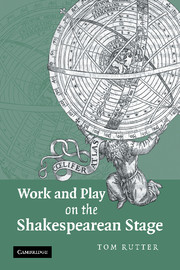Book contents
- Frontmatter
- Contents
- Acknowledgements
- Note on texts and dates
- Introduction
- Chapter 1 Work in sixteenth-century England
- Chapter 2 ‘Vpon the weke daies and worke daies at conuenient times’: acting as work in Elizabethan England
- Chapter 3 ‘Though he be a king, yet he must labour’: work and nobility in Shakespeare's histories
- Chapter 4 ‘We may shut vp our shops, and make holiday’: workers and playhouses, 1599–1601
- Chapter 5 ‘Work upon that now!’: labour and status on the stage, 1599–1610
- Conclusion
- Notes
- Bibliography
- Index
Chapter 2 - ‘Vpon the weke daies and worke daies at conuenient times’: acting as work in Elizabethan England
Published online by Cambridge University Press: 22 September 2009
- Frontmatter
- Contents
- Acknowledgements
- Note on texts and dates
- Introduction
- Chapter 1 Work in sixteenth-century England
- Chapter 2 ‘Vpon the weke daies and worke daies at conuenient times’: acting as work in Elizabethan England
- Chapter 3 ‘Though he be a king, yet he must labour’: work and nobility in Shakespeare's histories
- Chapter 4 ‘We may shut vp our shops, and make holiday’: workers and playhouses, 1599–1601
- Chapter 5 ‘Work upon that now!’: labour and status on the stage, 1599–1610
- Conclusion
- Notes
- Bibliography
- Index
Summary
The sixth edition of Sir Thomas Overbury's character book The Wife appeared in 1615, two years after Overbury's death. Amongst other additions, it contains a character of ‘An excellent Actor’, possibly by John Webster, which appears to be a reply to John Cocke's ‘A common Player’, printed earlier that year in John Stephens' Satyrical Essayes Characters and Others. Cocke's player is ‘A daily Counterfeit’, a servile crowd-pleaser given to drink and of loose sexual morality. The author of ‘An Excellent Actor’, however, praises his subject's skill and the moral worth of his profession:
Whatsoeuer is commendable in the graue Orator, is most exquisitly perfect in him; for by a full and significant action of body, he charmes our attention: sit in a full Theater, and you will thinke you see so many lines drawne from the circumference of so many eares, whiles the Actor is the Center … By his action he fortifies morall precepts with example; for what we see him personate, we thinke truely done before vs: a man of deepe thought might apprehend, the Ghosts of our ancient Heroes walk't againe, and take him (at seuerall times) for many of them.
Clearly, the two characterists have very different ideas about the value of theatre and about what theatrical entertainers tend to be like as people. It is also notable, however, that the writer who seeks to disparage his subject calls him a player, and the one who seeks to praise him, an actor.
- Type
- Chapter
- Information
- Work and Play on the Shakespearean Stage , pp. 26 - 54Publisher: Cambridge University PressPrint publication year: 2008



